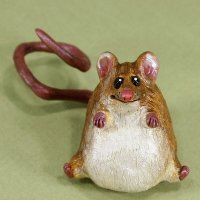Eat late, gain weight, ask me how


Scientists at Northwestern gave two groups of mice high fat food, varying only the time when the food was available.
(This little guy, from Fortheloveofcute, was not part of the study.)
Mice who ate when their biological clocks said sleep (during the day in their case) gained 48% of their baseline weight in new body fat. Mice who ate when they were supposed to (mice are nocturnal) gained 20%.
On the surface this seems to contradict a 2006 study from Oregon showing that rhesus monkeys who ate more at night were no more likely to gain weight than those who ate during the day.
Perhaps this can be explained by yet-another study, from the University of Pennsylvania, showing people who had their sleep restricted gained weight even though they ate less and felt less hungry.
It's circadian rhythms that seem to make the difference.
The natural pattern of sleep and wakefulness, driven by the Sun's absence or presence, tells our bodies when to slow down and speed up. Eating in harmony with those rhythms gets your food used up. Eat out of sync with them and your food lies there like a lump.
Changing a circadian rhythm is of keen concern to hospitals, which must have night shift doctors and nurses to handle emergencies.
They have found your rhythm actually moves following a natural 25 hour cycle. That's why you can party later-and-later during a Christmas break and have a tough time getting back to normal. But upsetting the circadian rhythm is very painful, as anyone who has suffered jet lag knows well.
So if you're a rock star and have worked to adjust your circadian rhythm so that you naturally sleep during the day, then it's likely that late-night breakfast after the show is OK. Studies of sleep and weight will probably head next to Keith Richards' house.